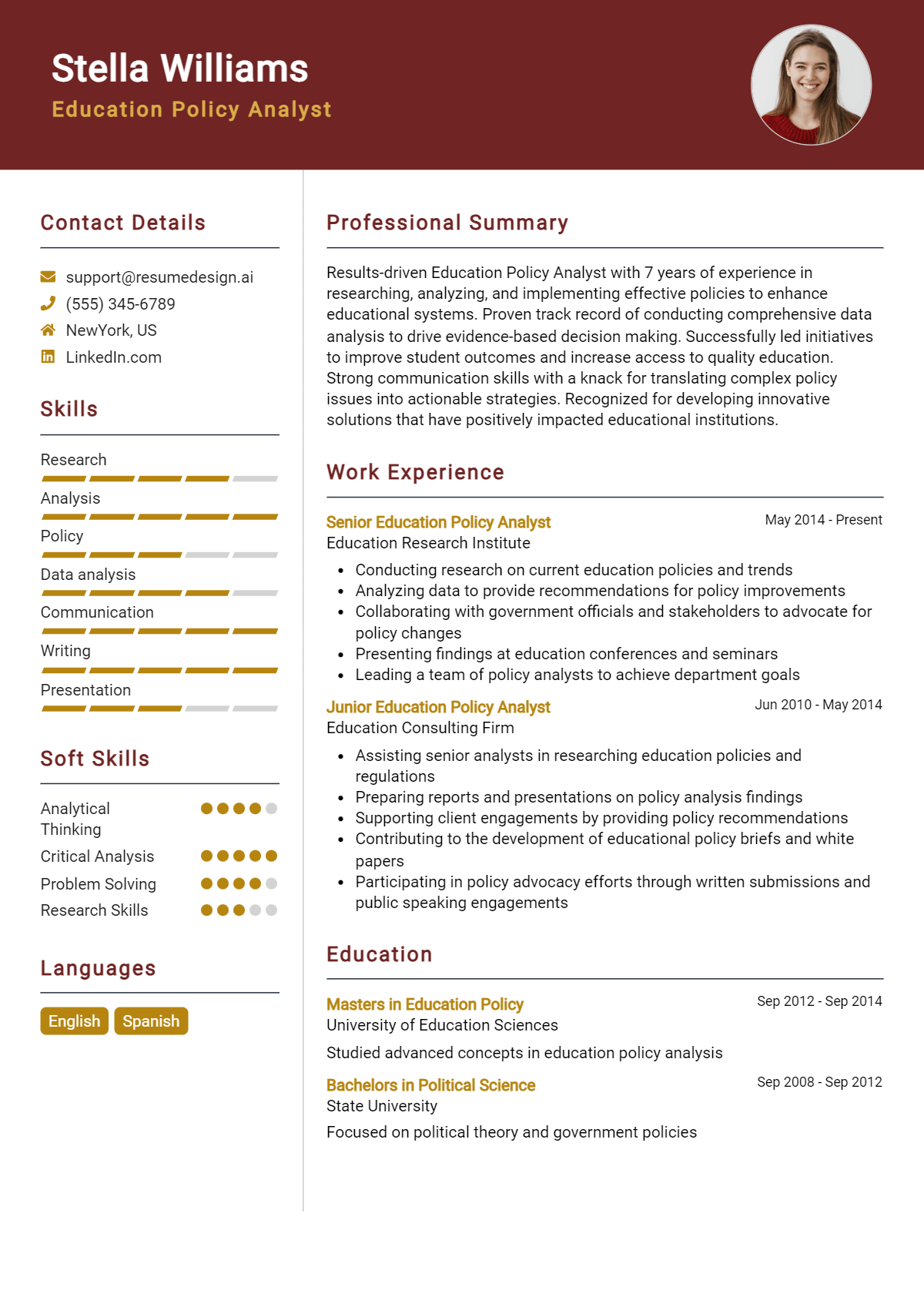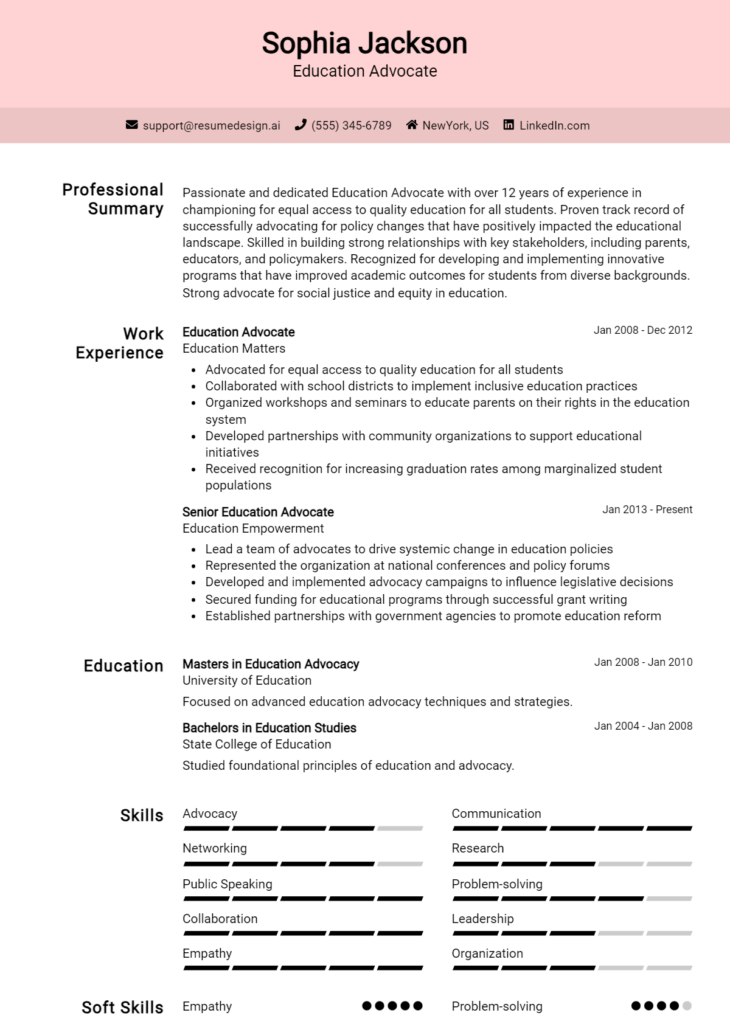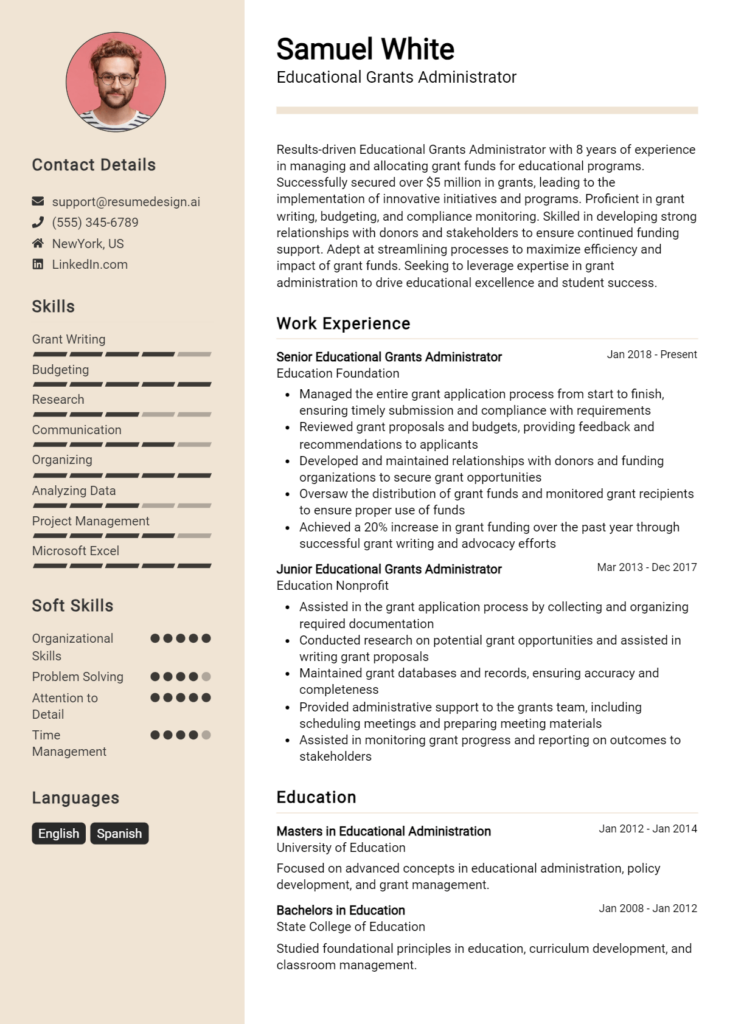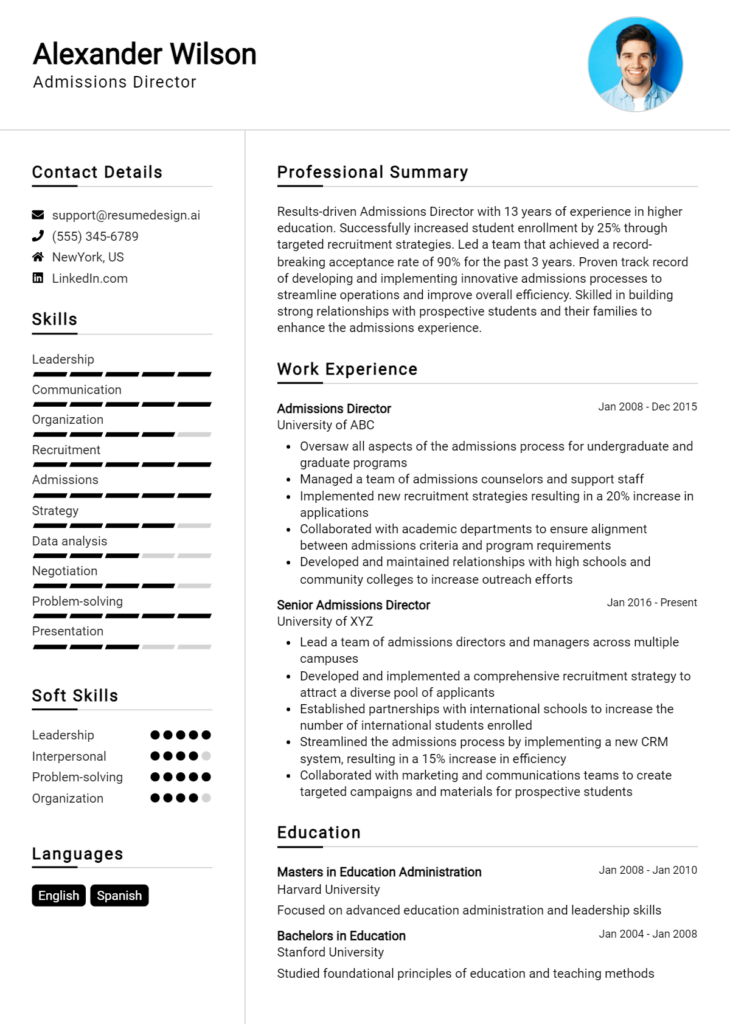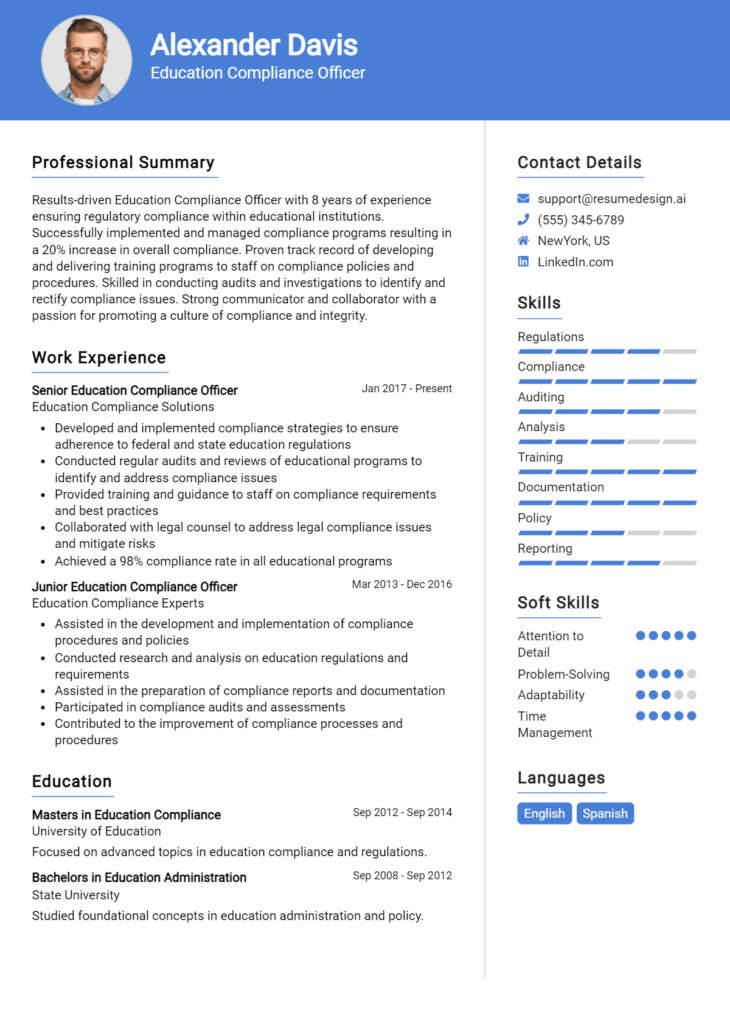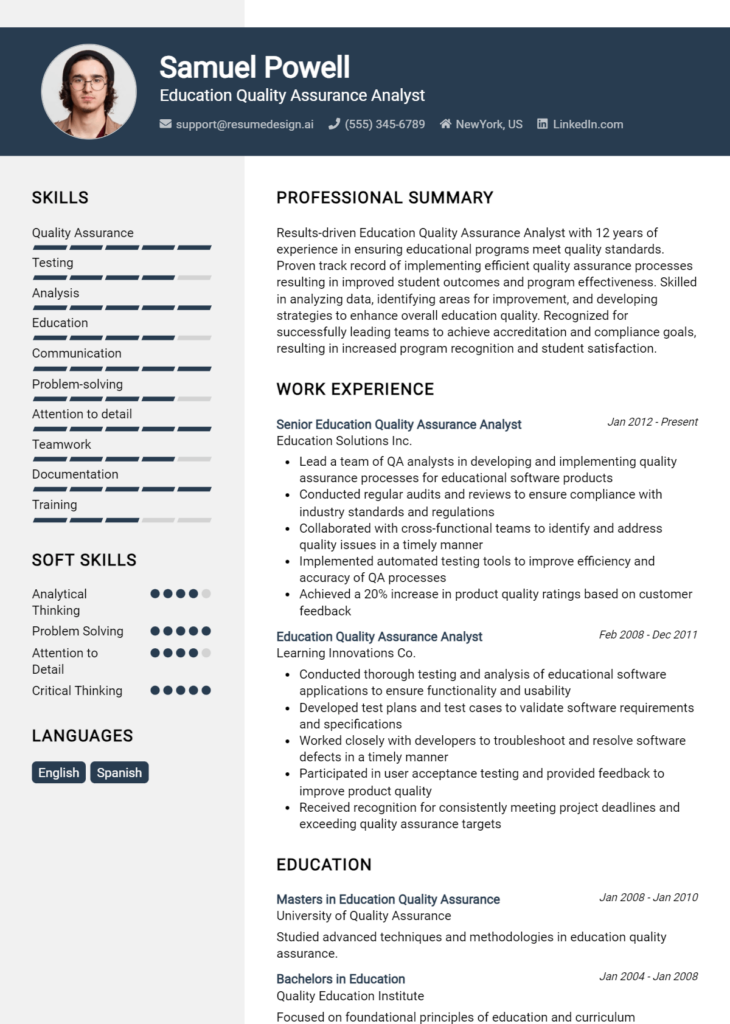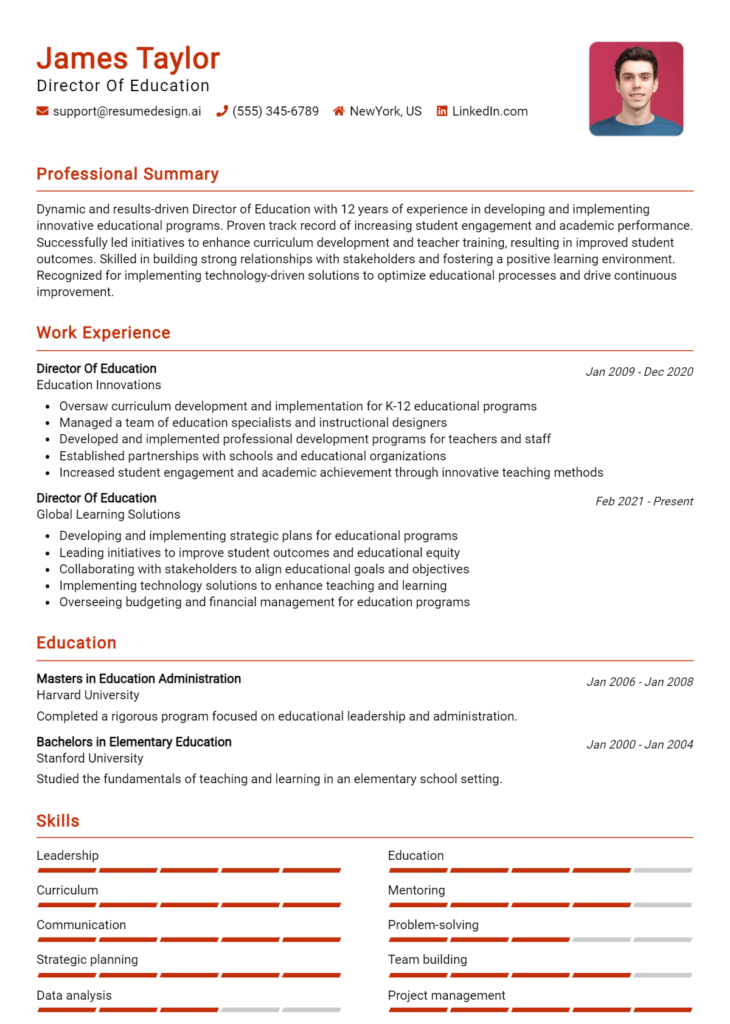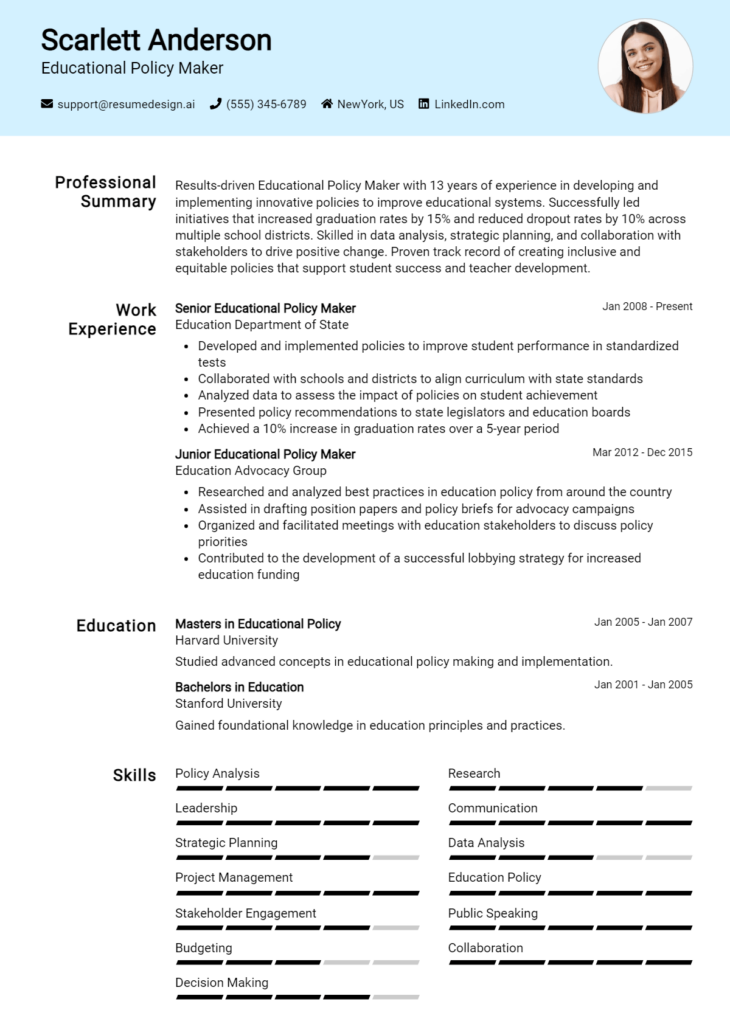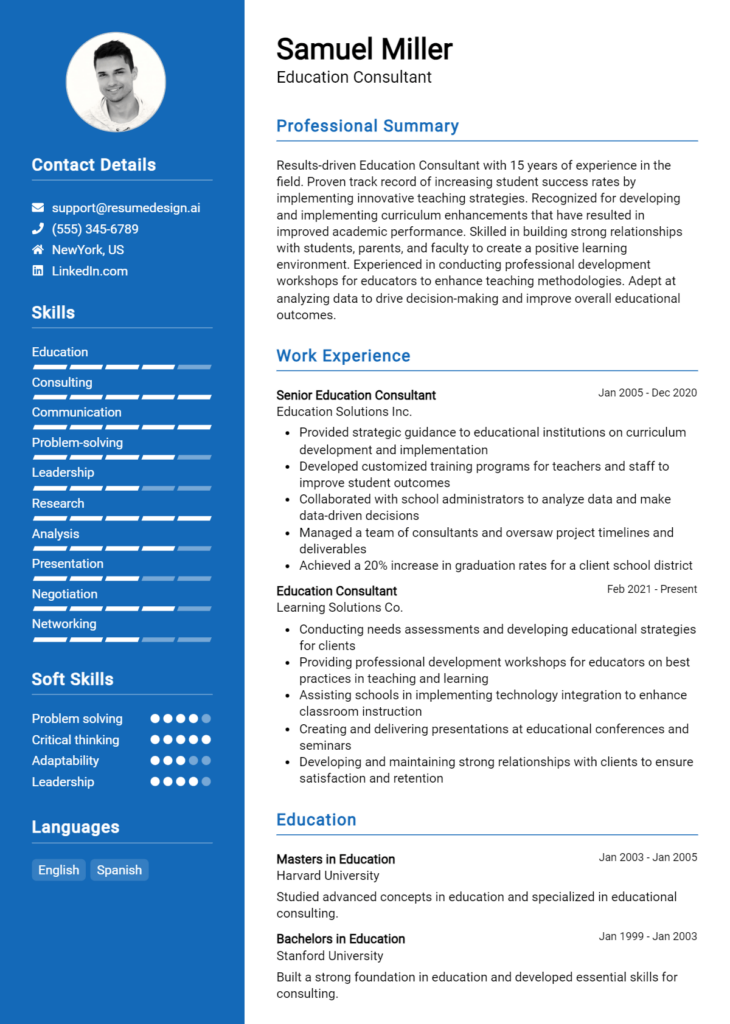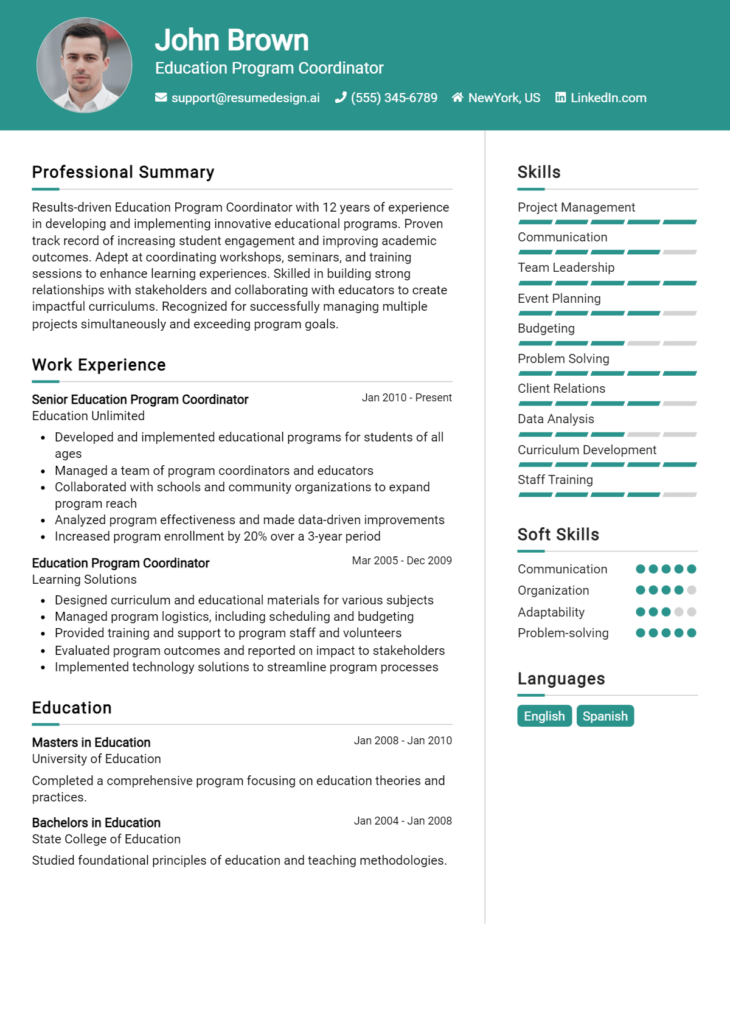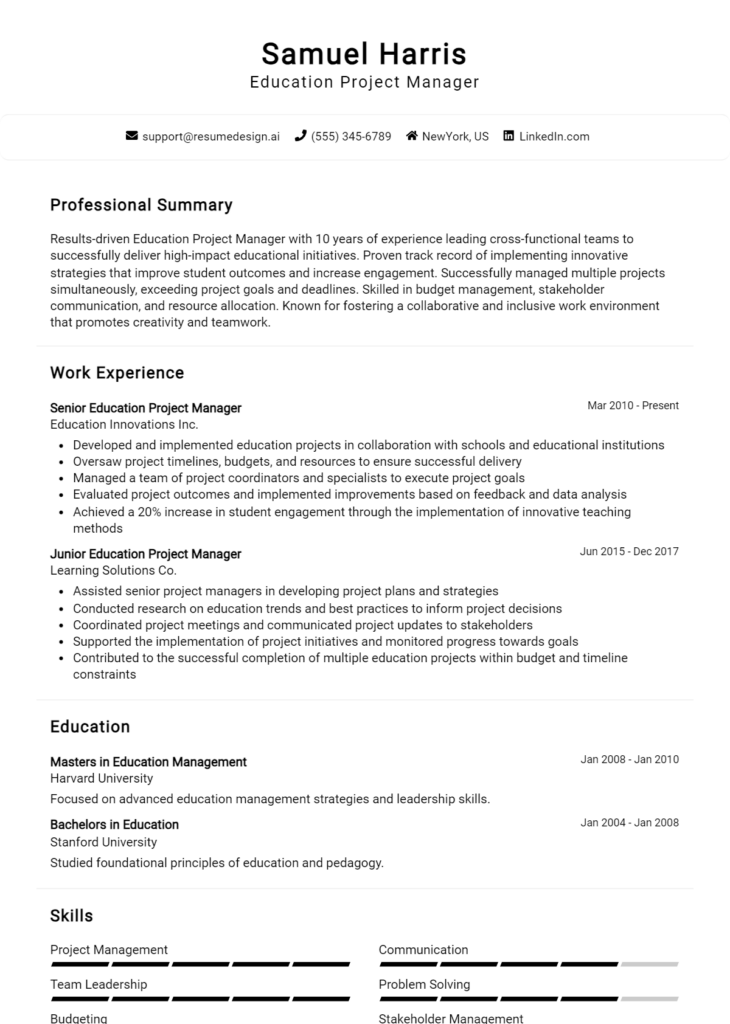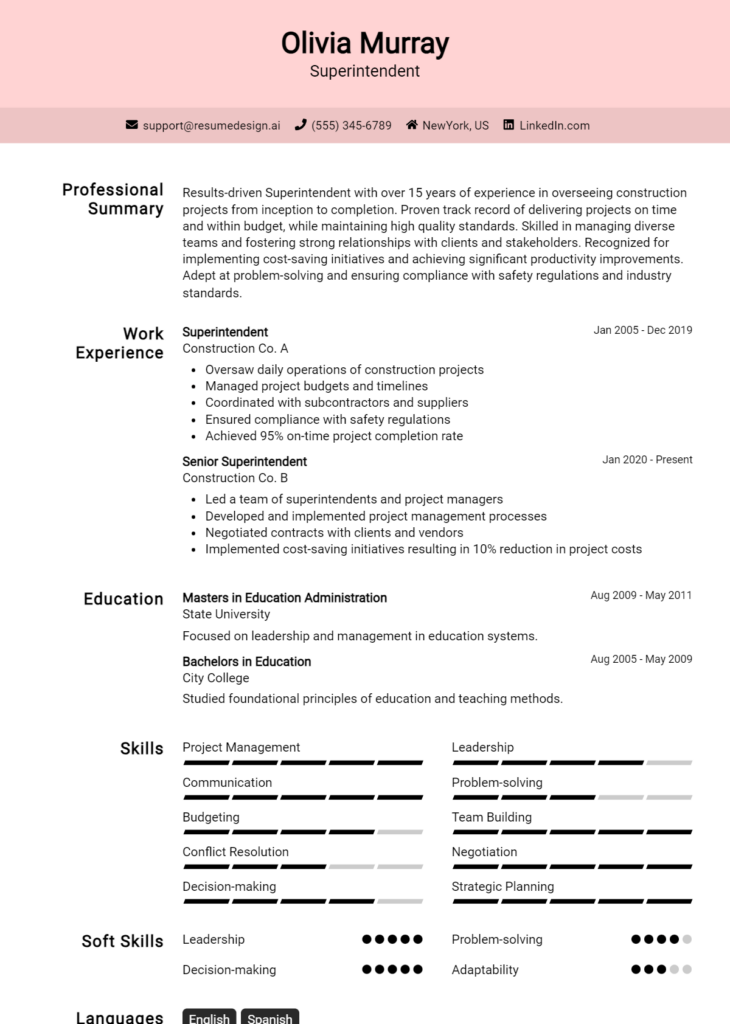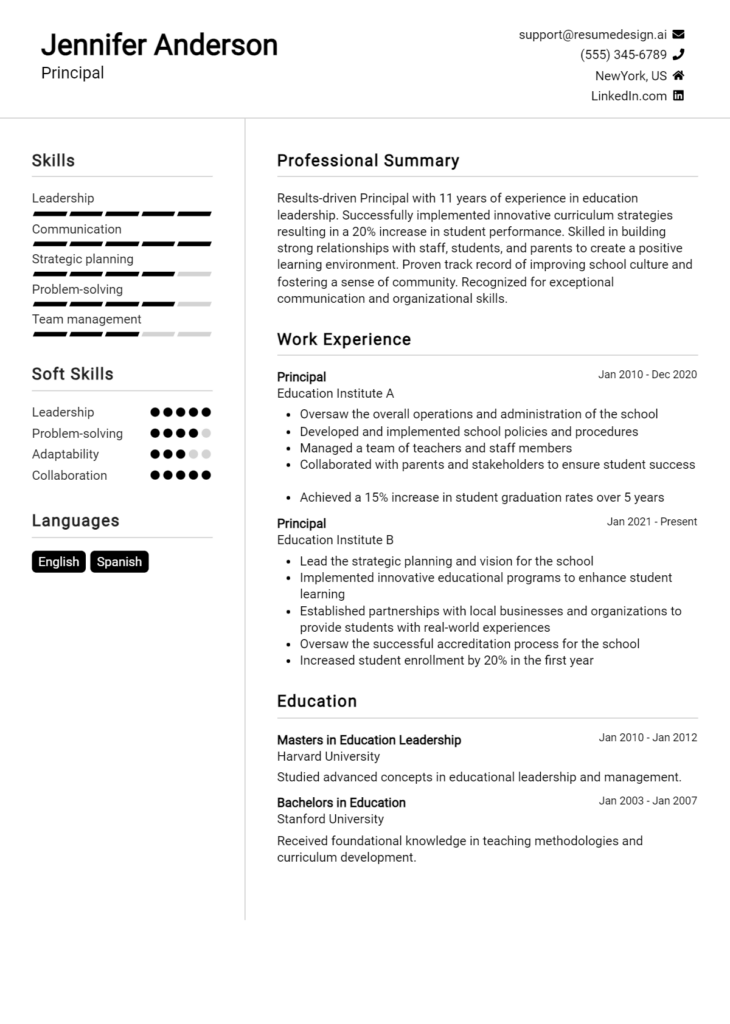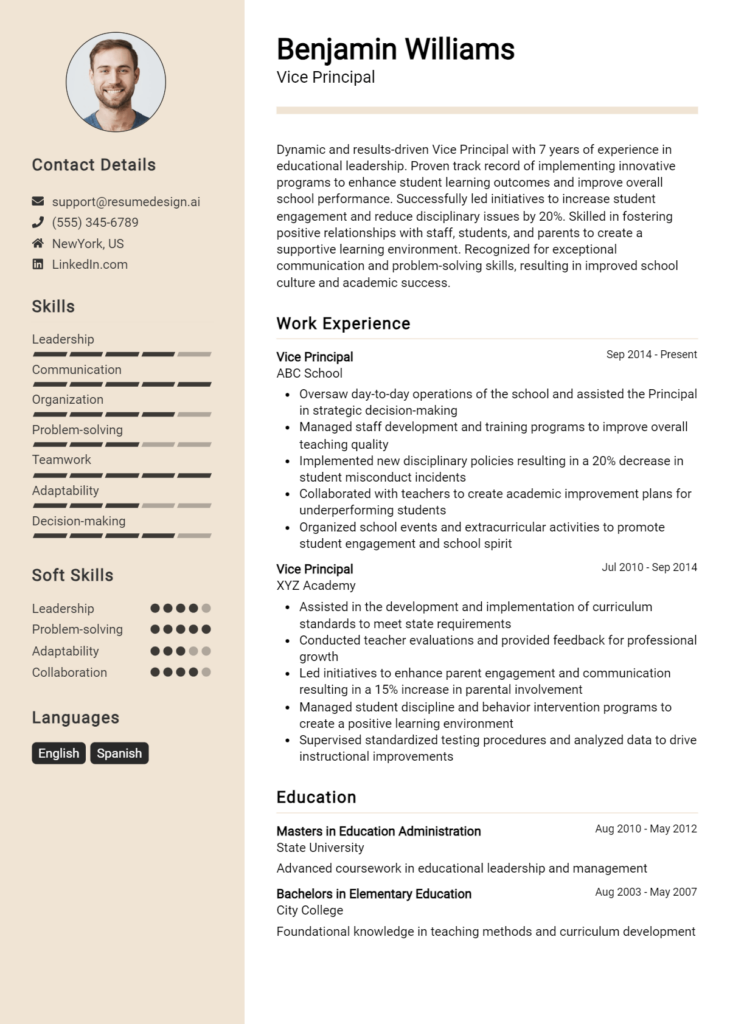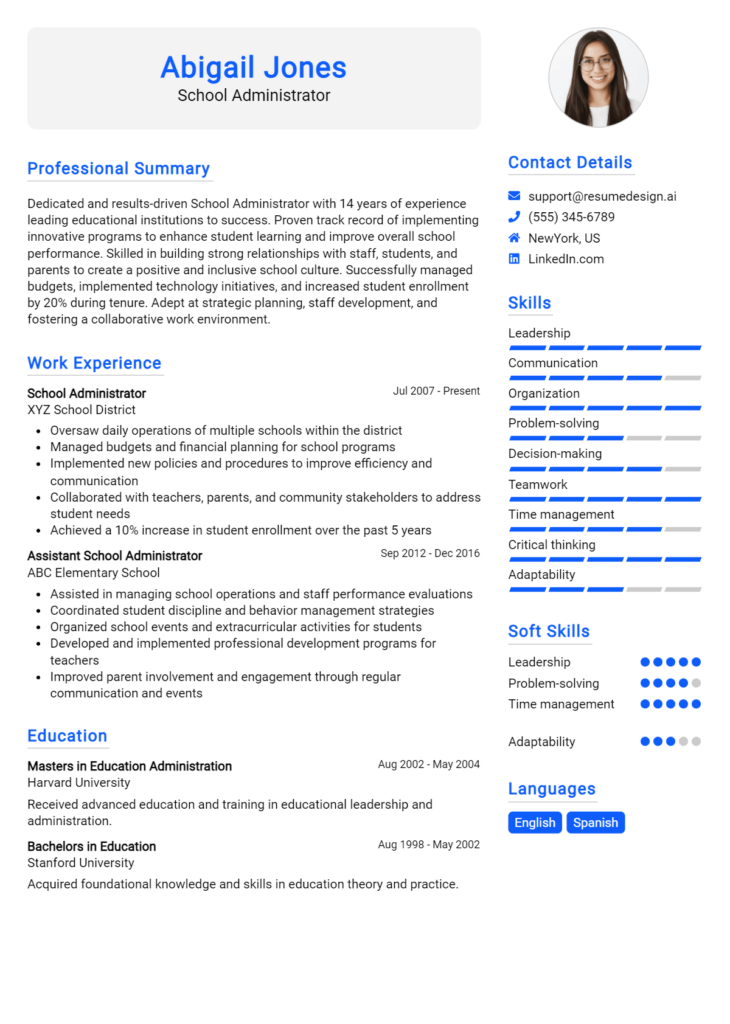Education Policy Analyst Core Responsibilities
An Education Policy Analyst plays a crucial role in shaping educational practices and policies by conducting research, analyzing data, and collaborating across departments. Key responsibilities include evaluating educational programs, advising stakeholders, and developing policy recommendations. Successful analysts possess strong technical skills, operational expertise, and problem-solving abilities, enabling them to navigate complex issues. These skills are vital in aligning educational strategies with organizational goals. A well-structured resume can effectively highlight these qualifications, enhancing job prospects.
Common Responsibilities Listed on Education Policy Analyst Resume
- Conducting quantitative and qualitative research to inform policy decisions
- Analyzing educational data and trends to assess program effectiveness
- Collaborating with educators, administrators, and policymakers to develop strategies
- Writing policy briefs and reports to communicate findings and recommendations
- Monitoring legislative changes and assessing their impact on education
- Facilitating stakeholder meetings and presenting research findings
- Developing and implementing evaluation frameworks for educational programs
- Advising on best practices and innovative solutions in education
- Engaging in advocacy efforts to promote effective educational policies
- Staying informed about national and state education trends
- Mentoring junior staff and contributing to team development
High-Level Resume Tips for Education Policy Analyst Professionals
In the competitive field of education policy analysis, a well-crafted resume is not just a document; it’s your first opportunity to make a lasting impression on potential employers. A resume serves as a crucial marketing tool that encapsulates your skills, achievements, and passion for education policy. It must effectively communicate your qualifications and demonstrate how you can contribute to the advancement of educational initiatives. This guide will provide practical and actionable resume tips specifically tailored for Education Policy Analyst professionals, ensuring that your resume stands out in a crowded job market.
Top Resume Tips for Education Policy Analyst Professionals
- Tailor your resume to the specific job description to highlight relevant skills and experiences that align with the employer's needs.
- Showcase your relevant experience in education policy, including internships, research projects, and previous roles in educational settings.
- Quantify your achievements with specific metrics, such as the number of policies developed or analyzed, or the percentage of improvement in educational outcomes.
- Highlight industry-specific skills, such as data analysis, legislative knowledge, and stakeholder engagement, to demonstrate your expertise in the field.
- Utilize action verbs to describe your responsibilities and accomplishments, making your contributions clear and impactful.
- Incorporate keywords from the job posting to ensure your resume passes through Applicant Tracking Systems (ATS) and captures the attention of hiring managers.
- Keep your resume concise and focused, ideally one page, emphasizing the most relevant experiences and skills for the role.
- Include a professional summary at the top of your resume that succinctly outlines your experience and career goals in education policy.
- Use a clean and professional format, ensuring readability and visual appeal to make a positive impression.
By implementing these tips, you can significantly increase your chances of landing a job in the Education Policy Analyst field. A well-structured and tailored resume not only showcases your qualifications but also demonstrates your commitment to the profession, making you a compelling candidate for prospective employers.
Why Resume Headlines & Titles are Important for Education Policy Analyst
In the competitive field of education policy, a resume headline or title serves as a critical first impression for potential employers. For an Education Policy Analyst, a strong headline can instantly capture the attention of hiring managers by summarizing key qualifications, areas of expertise, or unique contributions in a succinct and impactful manner. This brief yet powerful phrase should be crafted to be concise, relevant, and tailored specifically to the job being applied for, ensuring that it resonates with the expectations and needs of the hiring organization.
Best Practices for Crafting Resume Headlines for Education Policy Analyst
- Keep it concise—aim for a brief phrase that captures your essence.
- Focus on role-specific language that aligns with the job description.
- Highlight key skills or experiences that set you apart from other candidates.
- Avoid generic terms; be specific about your expertise in education policy.
- Use action-oriented words to convey a sense of proactivity and impact.
- Incorporate quantifiable achievements where possible to add credibility.
- Tailor your headline for each application to align with the company’s focus.
- Ensure it reflects your career goals and aligns with the position you seek.
Example Resume Headlines for Education Policy Analyst
Strong Resume Headlines
Dynamic Education Policy Analyst with 5+ Years of Experience in Data-Driven Decision Making
Results-Oriented Policy Advocate Specializing in K-12 Education Reform and Equity
Experienced Analyst with Proven Track Record in Legislative Analysis and Program Evaluation
Strategic Education Researcher Focused on Enhancing Student Outcomes Through Effective Policy
Weak Resume Headlines
Education Policy Analyst
Looking for a Job in Education
Experienced Professional in Education
Strong resumes headlines are effective because they clearly communicate the candidate's unique strengths and relevance to the position, making it easy for hiring managers to understand their qualifications at a glance. In contrast, weak headlines fail to impress due to their vagueness and lack of specificity, leaving hiring managers with no compelling reason to consider the applicant further. By crafting concise and targeted headlines, candidates can significantly enhance their chances of standing out in a crowded job market.
Writing an Exceptional Education Policy Analyst Resume Summary
In the competitive field of education policy, a well-crafted resume summary serves as a critical introductory statement that can significantly influence a hiring manager's first impression. A strong summary succinctly encapsulates your key skills, relevant experience, and notable accomplishments in education policy analysis, allowing you to stand out in a crowded applicant pool. Tailored to the specific job you are applying for, this section should be concise yet impactful, creating an immediate connection between your qualifications and the needs of the employer.
Best Practices for Writing a Education Policy Analyst Resume Summary
- Quantify Achievements: Use specific metrics and data to highlight your impact, such as "increased student performance by 20% through policy implementation."
- Focus on Relevant Skills: Highlight skills that are directly applicable to the role, such as data analysis, policy evaluation, and stakeholder engagement.
- Tailor for the Job Description: Customize your summary to reflect keywords and requirements from the job posting.
- Be Concise: Aim for 2-4 sentences that deliver your message clearly without unnecessary information.
- Showcase Unique Contributions: Mention any innovative solutions or unique approaches you have developed in your previous roles.
- Use Strong Action Verbs: Start with action-oriented words that convey your proactivity, such as "developed," "analyzed," or "collaborated."
- Highlight Relevant Education: If applicable, include your highest degree or any specialized training that enhances your qualifications.
- Maintain Professional Tone: Ensure your writing is formal and reflects your professionalism in the field of education policy.
Example Education Policy Analyst Resume Summaries
Strong Resume Summaries
Results-driven Education Policy Analyst with over 5 years of experience in developing and implementing data-driven policies that improved student outcomes by 25%. Expert in stakeholder engagement and educational research, with a proven track record of collaborating with cross-functional teams to drive systemic change.
Dynamic policy analyst skilled in analyzing educational data to inform policy decisions. Successfully led a project that reduced dropout rates by 15% in urban schools through targeted intervention strategies. Proficient in utilizing statistical software and presenting findings to diverse audiences.
Detail-oriented Education Policy Analyst with a Master’s degree in Public Policy, specializing in K-12 education reform. Spearheaded initiatives that resulted in a 30% increase in funding for underprivileged schools, leveraging strong analytical skills and a comprehensive understanding of legislative processes.
Weak Resume Summaries
Education Policy Analyst with some experience in the field. Looking for a new opportunity to use my skills.
Professional with a background in education policy. I want to help improve schools and make a difference.
The examples provided illustrate the distinction between strong and weak resume summaries. The strong summaries are specific, quantify results, and highlight relevant skills and experiences tailored to the role, making them compelling to hiring managers. In contrast, the weak summaries lack detail, fail to quantify achievements, and appear overly generic, which diminishes their effectiveness in capturing interest.
Work Experience Section for Education Policy Analyst Resume
The work experience section of an Education Policy Analyst resume is critical in demonstrating the candidate's relevant skills and accomplishments in the field. This section not only highlights the technical expertise needed to analyze and influence educational policies but also showcases the ability to manage teams effectively and deliver high-quality results. By quantifying achievements and aligning their experiences with industry standards, candidates can provide compelling evidence of their qualifications and potential contributions to prospective employers.
Best Practices for Education Policy Analyst Work Experience
- Clearly outline your roles and responsibilities in previous positions, focusing on technical skills relevant to education policy analysis.
- Quantify your achievements with metrics such as percentage improvements, number of policies influenced, or budget sizes managed.
- Highlight collaboration by detailing how you worked with various stakeholders, including educators, government officials, and community organizations.
- Use action verbs to start bullet points, showcasing your proactive approach and leadership abilities.
- Tailor your work experience to match the specific requirements listed in job descriptions for education policy analysts.
- Include relevant projects or initiatives that demonstrate your ability to deliver high-quality work under tight deadlines.
- Showcase any technical tools or methodologies you are proficient in, such as data analysis software or policy evaluation frameworks.
- Maintain a clear and organized format to ensure your work experience is easily readable and accessible to hiring managers.
Example Work Experiences for Education Policy Analyst
Strong Experiences
- Led a team of five analysts in the evaluation of statewide education policies, resulting in a 25% increase in student performance metrics over three years.
- Developed and implemented a data-driven policy framework that reduced administrative costs by 15% while improving service delivery to schools.
- Collaborated with local school districts to design and execute a comprehensive needs assessment, impacting over 10,000 students and informing future policy decisions.
- Presented findings to state legislators, successfully advocating for the adoption of three key policy reforms that enhanced educational access for underrepresented populations.
Weak Experiences
- Assisted in various education-related tasks without specific details on the outcomes or responsibilities.
- Participated in meetings and discussions regarding policy changes but did not have a clear role or impact.
- Worked on projects that were not clearly defined, making it difficult to assess contributions or results.
- Conducted research for reports without mentioning the scope, findings, or relevance to education policy.
The examples listed as strong experiences illustrate specific accomplishments, measurable impacts, and collaborative efforts that showcase the candidate's technical expertise and leadership skills. In contrast, the weak experiences lack clarity and quantifiable results, making it challenging to gauge the candidate's contributions and effectiveness in education policy analysis. This highlights the importance of detail and specificity in presenting work experience to potential employers.
Education and Certifications Section for Education Policy Analyst Resume
The education and certifications section of an Education Policy Analyst resume plays a crucial role in demonstrating the candidate's academic qualifications and professional expertise in the field. This section not only showcases the candidate's formal education but also emphasizes relevant certifications and continuous learning efforts that align with industry standards. By providing details about relevant coursework, specialized training, and recognized credentials, candidates can enhance their credibility and showcase their commitment to staying informed about the latest developments in education policy. A well-structured education and certifications section can significantly strengthen a candidate's profile, making them a more attractive choice for potential employers.
Best Practices for Education Policy Analyst Education and Certifications
- Prioritize relevant degrees such as a Master's in Education Policy, Public Policy, or similar fields.
- Include specific coursework that directly relates to education policy, data analysis, or program evaluation.
- List industry-recognized certifications, like the Certified Educational Planner (CEP) or other relevant credentials.
- Highlight any specialized training in statistical methods, qualitative research, or policy analysis.
- Ensure clarity and conciseness in formatting, making it easy for hiring managers to review qualifications quickly.
- Keep the education section updated with recent professional development activities or workshops attended.
- Utilize bullet points for easy readability, emphasizing key achievements or areas of expertise.
- Include honors or relevant academic accolades that demonstrate excellence in the field.
Example Education and Certifications for Education Policy Analyst
Strong Examples
- Master of Public Policy, Harvard University, 2022
- Certified Educational Planner (CEP), National Association for College Admission Counseling, 2023
- Relevant Coursework: Education Reform Strategies, Program Evaluation Methods, Quantitative Research in Education
- Graduate Certificate in Data Analysis and Policy Evaluation, University of California, 2021
Weak Examples
- Bachelor of Arts in History, State University, 2005
- Certification in Microsoft Office Suite, 2020
- Online Course: Introduction to Cooking, 2021
- High School Diploma, 2001
The strong examples provided are considered effective because they directly relate to the skills and knowledge required for an Education Policy Analyst, showcasing advanced degrees and certifications that are highly regarded in the field. They emphasize relevant coursework that demonstrates a deep understanding of education policy. Conversely, the weak examples highlight qualifications that are either outdated, irrelevant, or do not align with the expectations of the role, indicating a lack of focus on the essential skills and knowledge areas pertinent to education policy analysis.
Top Skills & Keywords for Education Policy Analyst Resume
As an Education Policy Analyst, possessing the right skills is crucial for effectively analyzing, developing, and advocating for educational policies that can impact schools, students, and communities. A well-crafted resume that highlights both hard and soft skills can significantly enhance your chances of landing a position in this competitive field. Employers are looking for candidates who not only understand the complexities of education systems but can also communicate their findings and collaborate with diverse stakeholders. By showcasing your skills, you can demonstrate your ability to navigate the challenges in education policy and contribute to meaningful change.
Top Hard & Soft Skills for Education Policy Analyst
Hard Skills
- Data analysis and interpretation
- Policy research and evaluation
- Statistical software proficiency (e.g., SPSS, R, SAS)
- Knowledge of education laws and regulations
- Program evaluation techniques
- Survey design and implementation
- Budget analysis and financial forecasting
- Geographic Information Systems (GIS)
- Report writing and documentation
- Familiarity with educational technology tools
Soft Skills
- Critical thinking and problem-solving
- Effective communication and presentation skills
- Team collaboration and interpersonal skills
- Time management and organizational skills
- Adaptability and flexibility
- Advocacy and negotiation skills
- Strategic thinking and planning
- Attention to detail
- Empathy and cultural competency
- Leadership and project management
By integrating these skills into your resume, along with relevant work experience, you can create a compelling case for your candidacy as an Education Policy Analyst.
Stand Out with a Winning Education Policy Analyst Cover Letter
I am writing to express my interest in the Education Policy Analyst position at [Organization Name], as advertised on [Job Board/Company Website]. With a Master’s degree in Education Policy from [University Name] and over five years of experience in policy analysis and advocacy, I have honed my skills in research, data analysis, and strategic communication. My passion for education reform and commitment to equitable access to quality education drive my work, making me an ideal candidate for this role.
In my previous position at [Previous Organization], I led a team that conducted extensive research on the impact of state education policies on marginalized communities. By employing both qualitative and quantitative methodologies, we were able to present actionable insights that informed legislative proposals aimed at improving educational outcomes. My ability to distill complex data into clear, persuasive recommendations was instrumental in securing funding for several initiatives focused on enhancing educational equity. I am particularly excited about the opportunity at [Organization Name] to leverage my analytical skills to influence policy that benefits all students, particularly those in underrepresented groups.
Furthermore, my experience collaborating with diverse stakeholders—including educators, government officials, and community organizations—has equipped me with the skills necessary to navigate the intricacies of policy advocacy. I am adept at building consensus and fostering relationships that drive meaningful change. I believe that effective education policy must be rooted in collaboration and community engagement, and I am eager to bring this approach to the team at [Organization Name].
I am excited about the potential to contribute to [Organization Name]’s mission and to drive impactful policy changes that support educational excellence and equity. I look forward to the opportunity to discuss how my background, skills, and passion align with the goals of your organization. Thank you for considering my application.
Common Mistakes to Avoid in a Education Policy Analyst Resume
When crafting a resume for an Education Policy Analyst position, it's crucial to avoid common pitfalls that can undermine your qualifications and experiences. A well-structured resume should effectively highlight your expertise, analytical skills, and understanding of educational systems. However, many candidates make mistakes that can detract from their strengths. Below are some common errors to avoid to ensure your resume stands out in a competitive field.
Using a Generic Resume: Tailoring your resume to the specific job description is essential. A generic resume fails to highlight the relevant skills and experiences that align with the job requirements.
Neglecting Quantifiable Achievements: Failing to include measurable outcomes in your previous roles can weaken your resume. Use numbers and statistics to demonstrate the impact of your work, such as "increased student engagement by 20% through policy implementation."
Overloading with Jargon: While familiarity with educational terminology is important, overusing jargon can make your resume difficult to read. Aim for clarity and conciseness to ensure your key points are understood.
Ignoring Formatting Consistency: A poorly formatted resume can be visually unappealing and hard to navigate. Ensure that fonts, bullet points, and spacing are consistent throughout the document to create a professional look.
Listing Responsibilities Instead of Accomplishments: Simply listing job duties does not effectively showcase your capabilities. Focus on your accomplishments and the specific contributions you made in previous roles.
Omitting Relevant Skills: An Education Policy Analyst should possess both analytical and communication skills. Failing to include a dedicated skills section can result in missing key qualifications that hiring managers are looking for.
Using Excessive Length: A resume that is too long can overwhelm the reader. Aim for a concise, one to two-page document that highlights your most relevant experiences and skills without unnecessary detail.
Not Proofreading: Typos or grammatical errors can create a negative impression. Always proofread your resume multiple times and consider having someone else review it to catch any mistakes.
Conclusion
As we explored the pivotal role of an Education Policy Analyst, we highlighted the essential skills and qualifications that make a candidate stand out in this competitive field. Key competencies include strong analytical abilities, effective communication skills, and a deep understanding of educational systems and policies. Additionally, we discussed the importance of staying informed about current trends in education and being able to translate complex data into actionable recommendations.
In summary, whether you are a seasoned professional or just starting your career in education policy, it is crucial to ensure that your resume reflects your unique qualifications and experiences. Take a moment to review your Education Policy Analyst resume and consider how you can enhance it to better showcase your skills.
To assist you, we recommend utilizing available tools such as resume templates and resume examples to inspire and structure your resume effectively. If you're looking for a more personalized approach, try using a resume builder to create a polished document that captures your professional journey. Don't forget the importance of a compelling introduction—check out cover letter templates to craft an engaging cover letter that complements your resume.
Take action today and refine your application materials to open doors to exciting opportunities in education policy!

